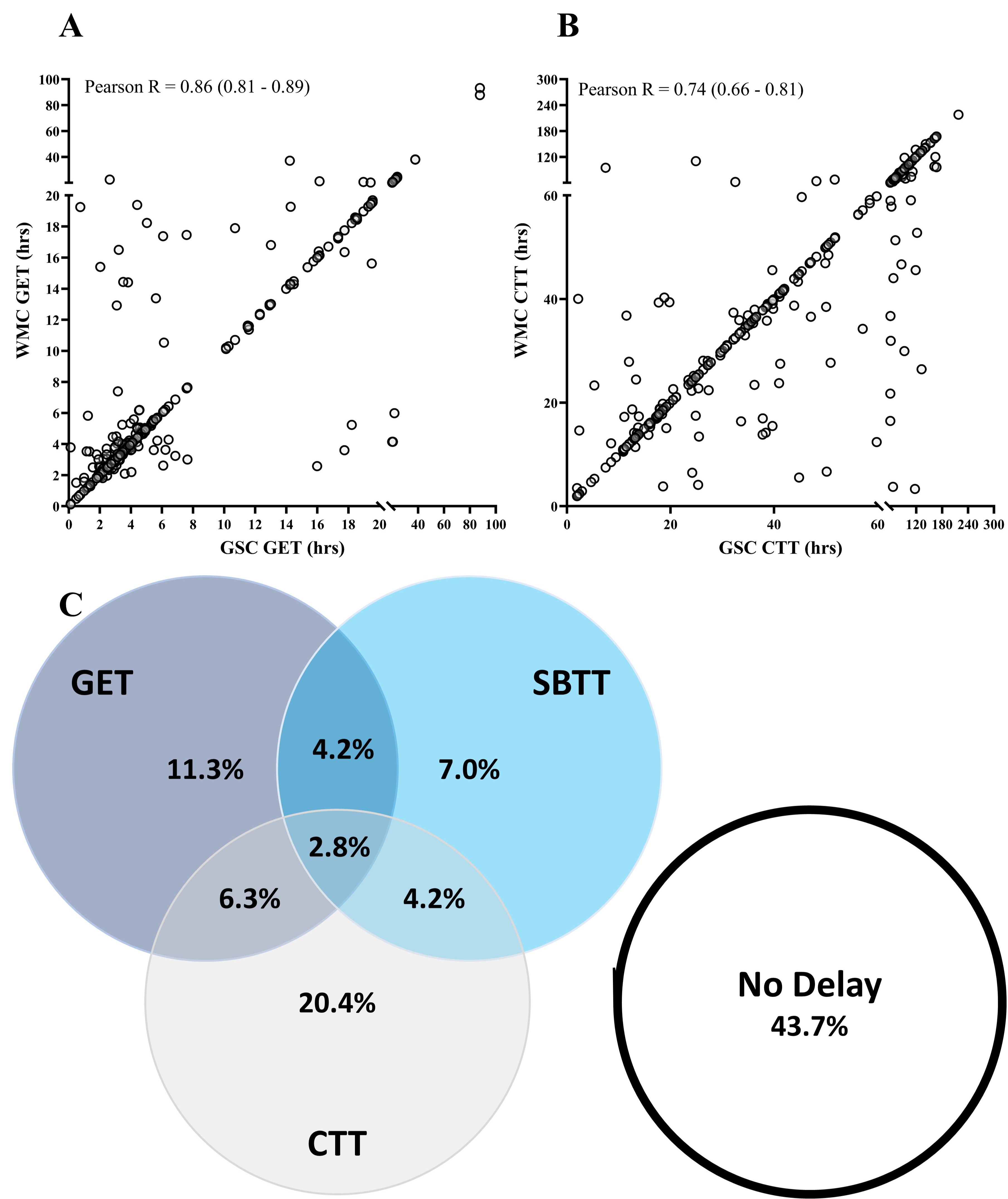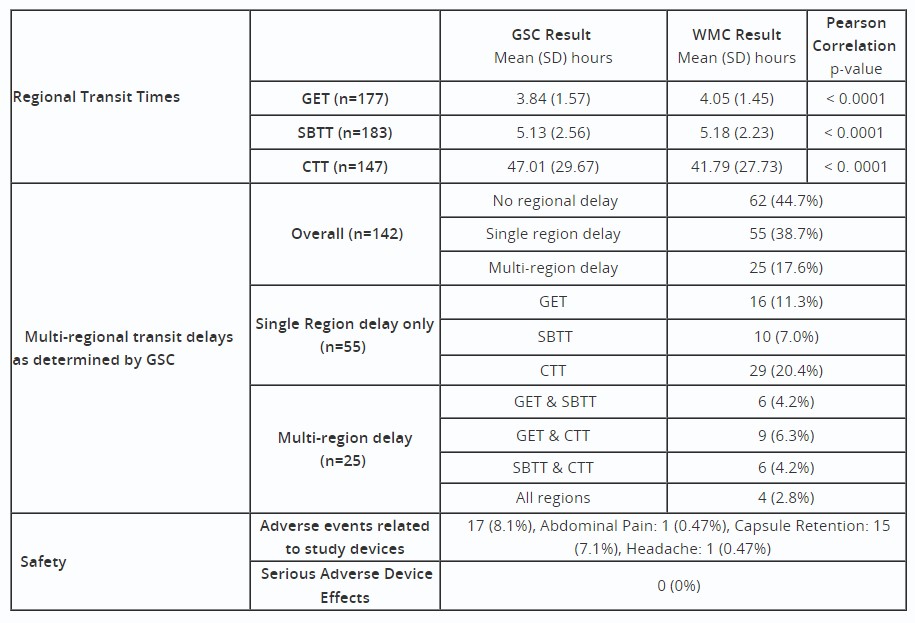Oral Paper Presentation
Annual Scientific Meeting
Session: Plenary Session 2A - Small Intestine / Functional / Liver
21 - Comparative Evaluation of Gas-Sensing Capsule and Wireless Motility Capsule for Transit Time Assessment in Motility Disorders
Tuesday, October 29, 2024
8:50 AM - 9:00 AM ET
Location: Terrace Ballroom 1

Braden Kuo, MD, MSc, FACG (he/him/his)
Center for Neurointestinal Health, Massachusetts General Hospital
Boston, MA
Presenting Author(s)
Braden Kuo, MD, MSc, FACG1, Allen Lee, MD2, Thomas Abell, MD3, Ashok Attaluri, MD4, Michael Cline, DO5, William L. Hasler, MD6, Vincent Ho, MBBS, PhD7, Anthony J. Lembo, MD8, Amir Masoud, MD9, Richard W. McCallum, MD10, Baharak Moshiree, MD11, Eamonn Quigley, MD12, Satish S. C.. Rao, MD, PhD13, Mayra Sanchez, MD14, Irene Sarosiek, MD15, Abigail Stocker, MD3, Brian Surjanhata, MD16, Jerry Zhou, PhD7, William D. Chey, MD, FACG2
1Center for Neurointestinal Health, Massachusetts General Hospital, Boston, MA; 2University of Michigan, Ann Arbor, MI; 3University of Louisville School of Medicine, Louisville, KY; 4Olathe Medical Center, Olathe, KS; 5Cleveland Clinic Foundation, Cleveland, OH; 6Mayo Clinic Arizona, Scottsdale, AZ; 7Western Sydney University, Sydney, New South Wales, Australia; 8Digestive Disease Institute, Cleveland Clinic, Cleveland, OH; 9Hartford Healthcare/Connecticut GI, Madison, CT; 10Texas Tech University Health Sciences Center School of Medicine, El Paso, TX; 11Advocate Health Wake Forest Medical University, Charlotte, NC; 12Houston Methodist Hospital, Houston, TX; 13Medical College of Georgia, Augusta University, Augusta, GA; 14Hartford HealthCare, Hartford, CT; 15Texas Tech University Health Sciences Center El Paso, El Paso, TX; 16Massachusetts General Hospital, Boston, MA
Introduction: Motility disorders, such as gastroparesis and slow transit constipation (STC), are common gastrointestinal (GI) conditions affecting up to 5% of individuals worldwide. The symptoms of motility disorders can be debilitating, affecting quality of life and driving utilization of healthcare systems. Diagnosis relies on evaluation of regional transit times, with delayed gastric and colonic transit indicated for gastroparesis and STC, respectively. A Food and Drug Administration-cleared wireless motility capsule (WMC), has been used in the assessment of gastroparesis and STC since 2008 but has recently been discontinued, leaving a need for a like replacement. This study aimed to assess a novel gas-sensing capsule (GSC) against the WMC for the assessment of regional transit time in these conditions.
Methods: Individuals with upper, lower, or combined GI symptoms were recruited in a prospective multi-centre study. Participants concomitantly ingested the GSC and WMC in a randomized order. Regional transit times including Gastric Emptying Time (GET) and Colonic Transit Time (CTT) were measured and compared between the devices, where paired data were available. GET >5 hours and CTT >59 hours were defined as delayed.
Results: 213 participants were recruited across 12 sites: 177 yielded paired GET results, and 147 for CTT. Pearson correlation coefficients for GET and CTT comparisons between GSC and WMC were 0.86 (0.81-0.89) and 0.74 (0.66 – 0.81) respectively. GET demonstrated a positive predicted value (PPV) of 78.00% (SE: 5.86%), negative predictive value of 85.83% (SE: 3.09%), and overall agreement of 83.62% (SE: 2.78%). For CTT, PPV was 67.35% (SE: 6.70%), negative predictive value was 92.89% (SE: 2.60%), and overall agreement was 84.35% (SE: 3.00%). No serious adverse device effects were reported. 32.2% of the total GET evaluable cohort had delayed GET, 27.2% of the CTT evaluable cohort had delayed CTT. For the cohort that had measurement for all transit regions, 20% had delayed CTT only, 11% had delayed GET only and 18% had a delay in multiple GI regions as measured by GSC.
Discussion: The GSC exhibited substantial agreement with WMC in measuring both GET and CTT, highlighting its utility as a potential replacement for the discontinued WMC for assessment of motility disorders. Observations of multi-regional dysmotility further highlight the value of measuring multiple regional of the GI tract with a single test.


Disclosures:
Braden Kuo, MD, MSc, FACG1, Allen Lee, MD2, Thomas Abell, MD3, Ashok Attaluri, MD4, Michael Cline, DO5, William L. Hasler, MD6, Vincent Ho, MBBS, PhD7, Anthony J. Lembo, MD8, Amir Masoud, MD9, Richard W. McCallum, MD10, Baharak Moshiree, MD11, Eamonn Quigley, MD12, Satish S. C.. Rao, MD, PhD13, Mayra Sanchez, MD14, Irene Sarosiek, MD15, Abigail Stocker, MD3, Brian Surjanhata, MD16, Jerry Zhou, PhD7, William D. Chey, MD, FACG2, 21, Comparative Evaluation of Gas-Sensing Capsule and Wireless Motility Capsule for Transit Time Assessment in Motility Disorders, ACG 2024 Annual Scientific Meeting Abstracts. Philadelphia, PA: American College of Gastroenterology.
1Center for Neurointestinal Health, Massachusetts General Hospital, Boston, MA; 2University of Michigan, Ann Arbor, MI; 3University of Louisville School of Medicine, Louisville, KY; 4Olathe Medical Center, Olathe, KS; 5Cleveland Clinic Foundation, Cleveland, OH; 6Mayo Clinic Arizona, Scottsdale, AZ; 7Western Sydney University, Sydney, New South Wales, Australia; 8Digestive Disease Institute, Cleveland Clinic, Cleveland, OH; 9Hartford Healthcare/Connecticut GI, Madison, CT; 10Texas Tech University Health Sciences Center School of Medicine, El Paso, TX; 11Advocate Health Wake Forest Medical University, Charlotte, NC; 12Houston Methodist Hospital, Houston, TX; 13Medical College of Georgia, Augusta University, Augusta, GA; 14Hartford HealthCare, Hartford, CT; 15Texas Tech University Health Sciences Center El Paso, El Paso, TX; 16Massachusetts General Hospital, Boston, MA
Introduction: Motility disorders, such as gastroparesis and slow transit constipation (STC), are common gastrointestinal (GI) conditions affecting up to 5% of individuals worldwide. The symptoms of motility disorders can be debilitating, affecting quality of life and driving utilization of healthcare systems. Diagnosis relies on evaluation of regional transit times, with delayed gastric and colonic transit indicated for gastroparesis and STC, respectively. A Food and Drug Administration-cleared wireless motility capsule (WMC), has been used in the assessment of gastroparesis and STC since 2008 but has recently been discontinued, leaving a need for a like replacement. This study aimed to assess a novel gas-sensing capsule (GSC) against the WMC for the assessment of regional transit time in these conditions.
Methods: Individuals with upper, lower, or combined GI symptoms were recruited in a prospective multi-centre study. Participants concomitantly ingested the GSC and WMC in a randomized order. Regional transit times including Gastric Emptying Time (GET) and Colonic Transit Time (CTT) were measured and compared between the devices, where paired data were available. GET >5 hours and CTT >59 hours were defined as delayed.
Results: 213 participants were recruited across 12 sites: 177 yielded paired GET results, and 147 for CTT. Pearson correlation coefficients for GET and CTT comparisons between GSC and WMC were 0.86 (0.81-0.89) and 0.74 (0.66 – 0.81) respectively. GET demonstrated a positive predicted value (PPV) of 78.00% (SE: 5.86%), negative predictive value of 85.83% (SE: 3.09%), and overall agreement of 83.62% (SE: 2.78%). For CTT, PPV was 67.35% (SE: 6.70%), negative predictive value was 92.89% (SE: 2.60%), and overall agreement was 84.35% (SE: 3.00%). No serious adverse device effects were reported. 32.2% of the total GET evaluable cohort had delayed GET, 27.2% of the CTT evaluable cohort had delayed CTT. For the cohort that had measurement for all transit regions, 20% had delayed CTT only, 11% had delayed GET only and 18% had a delay in multiple GI regions as measured by GSC.
Discussion: The GSC exhibited substantial agreement with WMC in measuring both GET and CTT, highlighting its utility as a potential replacement for the discontinued WMC for assessment of motility disorders. Observations of multi-regional dysmotility further highlight the value of measuring multiple regional of the GI tract with a single test.

Figure: Part A: Correlation of WMC GET measure to GSC GET measure, Pearson R = 0.86. Part B: Correlation of WMC CTT measure to GSC CTT measure, Pearson R = 0.74. Part C: Venn diagram showing regional transit delay as measured by the GSC.

Disclosures:
Braden Kuo: ATMO – Consultant, Grant/Research Support. Phathom – Consultant. Takeda – Advisory Committee/Board Member, Grant/Research Support.
Allen Lee: Atmo – Consultant, Grant/Research Support. GSK – Consultant.
Thomas Abell: ADEPT-GI – Intellectual Property/Patents, Owner/Ownership Interest. Enterra Medical – Consultant. Neurogastrx – Grant/Research Support. Nuvaira – Consultant. Processa – Grant/Research Support. UpToDate – Royalties. Vanda – Consultant, Grant/Research Support.
Ashok Attaluri: ReStalsis Health Inc. – Grant/Research Support.
Michael Cline indicated no relevant financial relationships.
William Hasler: ATMO Biosciences – Grant/Research Support. Enterra Medical – Advisor or Review Panel Member. Evoke Pharma – Speakers Bureau.
Vincent Ho indicated no relevant financial relationships.
Anthony Lembo: Allurion – Stock Options. Bristol Myers Squibb – Stock Options. Johnson & Johnson – Stock Options. Vibrant Advisory Board – Advisory Committee/Board Member.
Amir Masoud indicated no relevant financial relationships.
Richard McCallum: Evoke Pharma – Consultant.
Baharak Moshiree: AbbVie – Advisory Committee/Board Member. Allergan – Advisory Committee/Board Member. Alnylam Pharmaceuticals – Advisory Committee/Board Member. Ardelyx – Advisory Committee/Board Member. Atmo Biosciences – Advisory Committee/Board Member, Grant/Research Support. Biora Therapeutics (formerly Progenity) – Advisory Committee/Board Member. CinDome Pharma – Grant/Research Support. CinPhloro Pharma – Grant/Research Support. Restalsis Health – Grant/Research Support. Salix Pharmaceuticals of Bausch Health – Grant/Research Support. Takeda Pharmaceuticals – Grant/Research Support.
Eamonn Quigley: Atmo Biosciences – Advisor or Review Panel Member, Consultant, Grant/Research Support. Cindome – Grant/Research Support. Food Marble – Consultant. Nimble – Consultant. Novozymes – Consultant. Takeda – Grant/Research Support. Vibrant – Advisor or Review Panel Member, Consultant, Grant/Research Support. Vibrant Advisory Board – Advisory Committee/Board Member.
Satish Rao: Ironwood Pharmaceuticals – Advisory Committee/Board Member, Grant/Research Support. Pallette life sciences – Advisor or Review Panel Member.
Mayra Sanchez indicated no relevant financial relationships.
Irene Sarosiek indicated no relevant financial relationships.
Abigail Stocker indicated no relevant financial relationships.
Brian Surjanhata: Atmo Biosciences – Grant/Research Support, Received funding support to conduct this clinical trial..
Jerry Zhou indicated no relevant financial relationships.
William Chey: AbbVie – Consultant. Ardelyx – Consultant. Atmo BioSciences – Consultant. Comvita – Consultant. Corprata – Stock Options. Dieta Health – Stock Options. FoodMarble Digestive Health – Consultant, Stock Options. Ironwood Pharmaceuticals – Consultant. Modify Health – Stock Options. Nestlé S.A. – Consultant. Phathom Pharmaceuticals – Consultant. Redhill Biopharma – Consultant. Salix Pharmaceuticals – Consultant. Takeda – Consultant. Vibrant Gastro – Consultant.
Braden Kuo, MD, MSc, FACG1, Allen Lee, MD2, Thomas Abell, MD3, Ashok Attaluri, MD4, Michael Cline, DO5, William L. Hasler, MD6, Vincent Ho, MBBS, PhD7, Anthony J. Lembo, MD8, Amir Masoud, MD9, Richard W. McCallum, MD10, Baharak Moshiree, MD11, Eamonn Quigley, MD12, Satish S. C.. Rao, MD, PhD13, Mayra Sanchez, MD14, Irene Sarosiek, MD15, Abigail Stocker, MD3, Brian Surjanhata, MD16, Jerry Zhou, PhD7, William D. Chey, MD, FACG2, 21, Comparative Evaluation of Gas-Sensing Capsule and Wireless Motility Capsule for Transit Time Assessment in Motility Disorders, ACG 2024 Annual Scientific Meeting Abstracts. Philadelphia, PA: American College of Gastroenterology.

